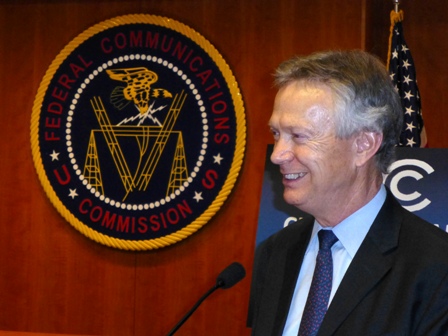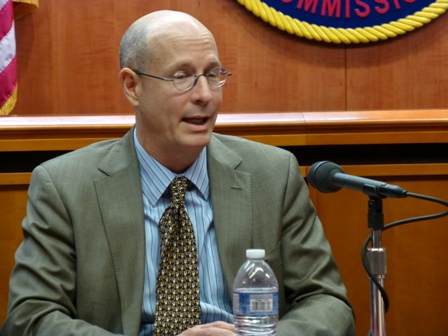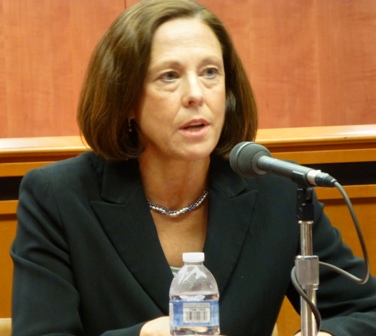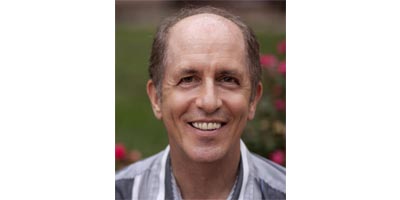FCC Delves Into Channel Sharing Workshop
WASHINGTON: On Tuesday, May 22, the FCC called on interested parties to discuss the ramifications of its plan to permit “channel sharing,” where two or more licensed television stations share the same 6 MHz channel assignment.

Bill Lake, chief of the FCC's Media Bureau, kicks off the discussion at the Channel Sharing Workshop. Kicked off by Bill Lake, chief of the FCC’s Media Bureau, the Channel Sharing Workshop fielded a panel of regulatory and financial experts to examine how channel sharing might actually work. Lake was clear from the start that this was not an attempt to grab broadcast spectrum.
“Contributions by broadcasters to the auction will be strictly voluntary, in exchange for a share of auction proceeds” he said.
Broadcasters can participate in the auction in three ways: By taking a station off the air and surrendering its license; by relinquishing spectrum in order to share a TV channel with one or more licensees; or by moving from a UHF channel to a VHF channel. Each of these has different value consequences, and the reimbursement to broadcasters will ultimately depend on that value.
Much of the discussion at the workshop centered around just what exactly that value might be.
“The idea behind the auction is that it can provide a way for a broadcaster to contribute spectrum to the auction, receive a capital infusion by sharing in the auction proceeds, and stay on the air and continue to serve viewers,” Lake said. “Each channel-sharing station will remain a separate FCC licensee, with all of the rights and duties of the licensee.”
In addition to channel sharing being voluntary, Lake also pointed out that stations will have a say in which broadcasters they choose as partners and that stations retain the right to decide exactly how the channel will be shared. The possibility of channel sharing will be available to full-power and Class A stations—low-power stations other than Class A are not eligible to participate in the channel-sharing plan.
The bulk of the Channel Sharing Workshop consisted of a panel discussion. The invited panelists were John Cunney, head of telecom media technology practice for Santander; Eric De Silva, a partner at Wiley Rein, a Washington law firm that specializes in communications issues; John Hane, an attorney with Washington law firm Pillsbury Winthrop Shaw Pittman; and Lonna Thompson, executive vice president and COO for the Association of Public Television Stations.
The professional video industry's #1 source for news, trends and product and tech information. Sign up below.
CAUTIOUS INTEREST

John Hane, attorney, Pillsbury Winthrop Shaw Pittman The FCC acknowledges that not all stations will be interested in channel sharing, which was the first topic discussed by the panel.
“The stations that are likely to consider channel sharing are stations that may not feel like they have a robust and profitable business going forward with a full channel,” said Hane.
Others agreed.
“When you look at the spectrum value of certain stations versus the broadcast value, there are a lot of stations where the broadcast value is significantly higher than the spectrum value,” said Cunney. “And those guys are not going to be interested in selling their full station.”
Cunney also pointed out that some stations not likely to participate in channel sharing are those who place a high value on future technologies and the ability to use their spectrum for other than their primary stream.
“I’ve talked to people who have a view that mobile TV will be a huge value creation for them in the future, or other types of enhanced services being used with new tech-nologies,” he said.

Lonna Thompson, executive vice president and COO for the Association of Public Television Stations Thompson, who represents public TV stations, pointed out the unique characteristics of public stations.
“We have a statutory obligation—it’s part of our mission—to provide universal service,” she said. “Our stations reach 99.99 percent of this country and many places where our stations serve, they’re the only broadcast service available to the public. We can’t diminish quality of services, and we need to always ensure universal service around the country.”
During the course of the presentation, there were references to the National Broadband Plan and its intention to free up 120 MHz of spectrum for wireless broadband services. This will create a significant impact on broadcasters using the remaining spectrum.
“Part of the presumption in the FCC’s auction is that there are more stations out there than the country needs,” said Hane.
INCREASED VALUE
Since stations still standing after channel sharing and the spectrum auction will have fewer competitors, that may increase the value of these remaining broadcasters. This brought up an interesting observation that a “fat cat” station may do everything in its power to aid other stations to either auction off their spectrum or move into chan-nel-sharing deals. At the moment, there’s nothing in the channel-sharing proposal to prevent a wealthy station from encouraging others to vacate their licenses—in fact, the FCC may view such actions as beneficial for clearing the spectrum.
The FCC intends to have a Notice of Proposed Rulemaking (NPRM) for channel sharing in place this fall, however there is no timetable for future regulatory actions. Be-tween channel sharing, spectrum auctions and frequency repacking, there’s a lot going on for television broadcasters to follow.
The bottom line is that there is considerable money at stake: The Congressional Budget Office examined the proposal to free up 120 MHz for the National Broadband Plan, and valued this spectrum at “north of $20 billion.” At the moment, the federal government has $1.75 billion set aside to reimburse broadcasters for the cost of spectrum repacking, and stations will get a share of the auction proceeds if they vacate their licenses or decide to share a channel.
Prior to the NPRM this fall, the FCC plans to have additional workshops to further clarify the rules for channel sharing. If all this sounds complicated, it is.
“The devil is in the details, and we’re a long way from getting to the details at this point,” said Pillsbury’s John Hane.
Watch the FCC’s May 22 Channel Sharing Workshop
Bob Kovacs is the former Technology Editor for TV Tech and editor of Government Video. He is a long-time video engineer and writer, who now works as a video producer for a government agency. In 2020, Kovacs won several awards as the editor and co-producer of the short film "Rendezvous."

